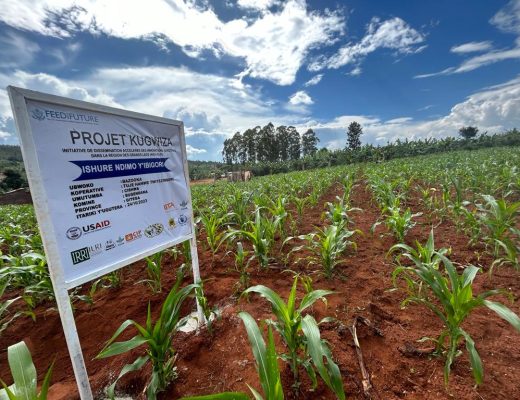Persistent gender inequalities within agrifood systems limit equitable access to resources, decision-making power, and economic opportunities. Recognizing the need for systemic change, the Gender Equality and Inclusion Accelerator conducted a pilot training course on Gender Transformative Approaches (GTAs) for development partners Kolping Society of Tanzania (KST) and Nyakitonto Youth for Development Tanzania (NYDT) in April 2025.
Through this four-module course, researchers at IITA trained a total of 43 both KST and NYDT staff members, equipping them with knowledge and practical tools on how to use GTAs in agrifood systems. The training provided participants with critical insights into gender inequalities in agrifood systems, practical strategies for implementing GTAs, and frameworks for measuring gender transformative change in their development projects.

KST staff proudly displaying their certificates after completing the training. Photo credit: Sarah Msita
Module 1: Gender Transformative Approaches in Agrifood Systems
The first module established the importance of gender in agrifood systems, examining how power dynamics shape access to resources, decision-making, and economic opportunities. Participants explored the continuum of gender-aware approaches, ranging from Gender Blind to Transformative Approaches—assessing their strengths and limitations.

IITA facilitator Devis Mwakanyamale engaging participants with a detailed explanation during the training. Photo credit: Sarah Msita
A participant of the training course reflected: “Before this course, I thought gender work was only about women. Now I understand it’s about power, access, and fairness for everyone.”
This module provided a foundational lens for understanding gender inequalities in agrifood systems, encouraging participants to think critically about systemic barriers and the pathways toward true transformation. More insights on this module can be found here.
Module 2: Characteristics Important to Gender Transformative Approaches
Module 2 deepened participants’ understanding of GTA principles—including intersectionality, inclusivity, and norm-shifting strategies. Through interactive discussions, course participants explored methods for engaging men and community gatekeepers in gender equality conversations.
A youth staff from NYDT shared: “Transformation is not just about training women but also changing the attitudes of men.”
The module reinforced that gender equality requires systemic change, not just individual empowerment. More details on this module can be accessed here.
Module 3: Operationalizing Gender Transformative Approaches
Bridging theory with practice, Module 3 focuses on practical steps for integrating GTAs into agrifood systems. It emphasizes identifying leverage points, establishing clear objectives, and ensuring that gender equality is central to the design and implementation of programs.
It introduced real-world case studies demonstrating effective GTA implementation in agrifood systems. Participants examined common barriers to transformation, including cultural resistance and resource constraints.
A KST course participant noted: “One of the biggest takeaways for me was learning how to involve elders and religious leaders in gender conversations—they are key to shifting community mindsets.”
The role of trusted community figures in helping facilitate gender transformative change emerged as a critical theme, alongside strategies for integrating gender education into schools and local governance structures. More details on this module can be accessed here.
NYDT staff engaged in a dynamic group discussion during mid-training. Photo credit: Sarah Msita
Module 4: Measuring Gender Transformative Change
The final module focused on evaluation frameworks, equipping participants with tools to track outcomes from interventions that intend to contribute to gender transformative change. Discussions emphasized participatory measurement approaches that prioritize community ownership of change.
A staff from KST observed: “Change must be seen and felt by the people, not just in reports. Measurement should include everyone, especially those who are usually left out.”
This module reinforced the necessity of inclusive tracking mechanisms that move beyond quantitative indicators to capture lived experiences. More details on this module can be accessed here.
Scaling Impact: Recommendations for Future Training
To strengthen the implementation and scaling of GTAs, course participants proposed several actionable strategies. These included expanding Swahili-language content to enhance accessibility and developing multimedia tools like posters, radio programs, and community guides for broader dissemination. Integrating GTA principles into educational curricula was also suggested to cultivate gender-aware citizens in Tanzania from an early age.
One course participant emphasized: “Let’s take this learning beyond workshops—into our homes, schools, and churches.”

NYDT participants proudly displaying their certificates after completing the training. Photo credit: Sarah Msita
Conclusion: Towards Inclusive Agrifood Systems
The GTA course has laid a solid foundation for participants by fostering critical self-reflection, capacity strengthening, and collective commitment among participants. As we move forward, sustained engagement with local actors, policymakers, and educational institutions will be essential when embedding GTA principles into agricultural development frameworks. Key partnerships, such as those with KST and NYDT, are already helping to drive this work forward, with ongoing co-design efforts and the start of implementation of gender transformative interventions in the cassava sector. These include gender transformative radio dialogues on women’s ownership of land and community dialogues on gender equality and women’s empowerment, with special focus on women’s leadership, ownership of resources, and decision making. These interventions are pivotal in ensuring that gender transformative change becomes a core focus in agricultural development programs, contributing to more inclusive and sustainable agrifood systems, especially in the cassava sector. For further insights on co-designing pathways to gender equality, visit this blog post, which explores IITA’s ongoing efforts to transform agrifood systems for gender equality and greater social inclusion.





No Comments